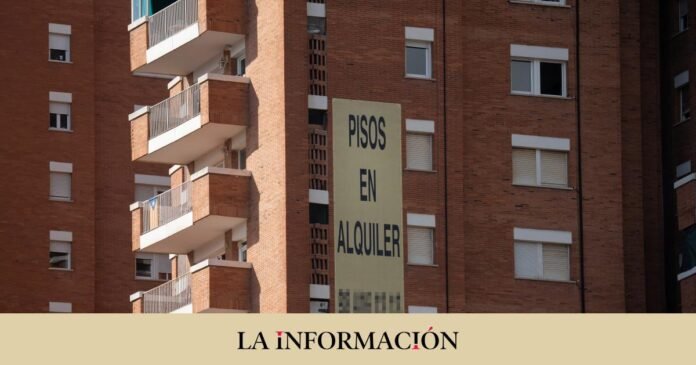Investing in an inflationary context is difficult. More when uncertainty rules. After an anomalous 2022 conditioned by the war, the rise in prices and the awakening of interest rates, investors may feel somewhat confused about the most appropriate option in which to deposit their savings, before the Price Index of Consumption (CPI) dynamites its value. At the present time, the focus in Spain is on the stock markets and, especially, on the Public Treasury auctions, which have gained prominence in recent weeks while banks remain reluctant to raise the remuneration of deposits.
Traditionally, the lack of financial culture and the conservative profile have pushed Spaniards to channel their savings towards the real estate sector. Now the statistics prove them right. The profitability of renting a home reaches 6.5% in Spain. According to the data compiled by Fotocasa, this figure has been more or less stable (above 6%) since 2017, although in the last twelve months the return has been maintained thanks to the rise in rental prices. This increase has also been accompanied by an increase in the price of housing, something that the aforementioned portal attributes to the fact that earnings have not changed since 2021.
The real estate sector has experienced a particular ‘boom’ in demand in 2022, in which many individuals have seen a niche in which to protect themselves from price turbulence. The ‘b side’ of the inflationary tensions is that those who have not paid in cash, that is, who have resorted to bank financing, are now faced with an increase in the cost of the mortgage that can reduce the income derived from rents.
Another important indicator to take into account is the relationship between the amount at which it is rented and the price that you have paid for the acquisition. This means that in cities like Madrid, the Balearic Islands, the Basque Country or Andalusia, profitability is below average. On the other hand, the Valencian Community leads the classification with a gross profit of 7.7%.
These percentages are in line with the one calculated by Oxford Economics for REITs, which in their Spanish version are called Socimis. The world’s largest economic advisory group estimates that real estate funds can earn average returns of between 6.5% and 7% per year through 2026 globally. In their latest publication, they have revised the figure upwards by almost two points compared to the projection released in July 2022, when the rate hike in both the United States and the Eurozone was only just beginning.
Fixed and variable income lags behind
According to the aforementioned British firm, real estate thus becomes one of the most interesting assets to invest in, above bonds or shares, for which they expect an annual return of 0.7% and 2.5%, respectively. , in the global computation. “In particular, you see an overvaluation in stocks relative to macroeconomic fundamentals, given the high valuations,” says Oxford Economics analyst Mark Unsworth.
Real estate funds can make an annual profit of 7%
Within equities, the Spanish stock market is one of the most generous with its shareholders from around the world, with an average return of 4% in the last three decades. This translated into the distribution of more than 23,600 million during the past year. Added to this are the collections of benefits that can be ‘hunted’ in the possible heat of the rises in the financial markets since the start of the year. Only so far this year, the Ibex 35 has registered a rise of 12.11%, in line with the Eurostoxx 50 (+12.2%), the second by revaluation only behind Italy (+13.7% ). It is followed by Paris (+11.7%), Frankfurt (+11.15%) and, with a little more distance, London (+6%).
Most analysts are cautious and invite not to get carried away by the ‘acceleration’ of recent weeks, since they consider that they have not yet hit bottom. In this regard, Bank of America is already discounting a correction of up to 20% in world stock markets in 2023. Also with less than encouraging macro prospects,” says Diego Morín, IG analyst.
For an investor, the problem lies in the high volatility to which financial markets are subject, especially since the outbreak of the pandemic, which has preceded problems in supply chains, the war in Ukraine, the energy crisis and inflation. . Consequences that draw a future scenario full of unknowns for the stock markets, pending the course that interest rates follow both in the euro area and in the United States.
Fixed income, for its part, is also showing signs of recovery after suffering the worst year in its history in decades. “There could be opportunities in the ‘high yield’ segment (speculative debt), although it always arose from the profile of each investor and the strategy that can be carried out. Nor can we forget the current scenario, where central banks could go too far at rates of increase and cause the feared economic recession, which makes this type of investment attractive for the portfolio”, remarks Morín. Provisional data released by Inverco point to an improvement in the profitability of fixed-income funds of almost 1%. However , the most illustrative example is found in the Treasury Bills, the short-term public debt.
The process of normalization of monetary policy by the European Central Bank (ECB) has boosted the yield of twelve-month paper, which has already touched 3% in January and is seen as one of the most attractive opportunities at the present time. , even if it is more than 50% lower than the annual earnings offered by the brick and is placed three points below the CPI in Spain (5.8%). In any case, none of the three alternatives beat the underlying rate, which last January climbed to 7.5%.

